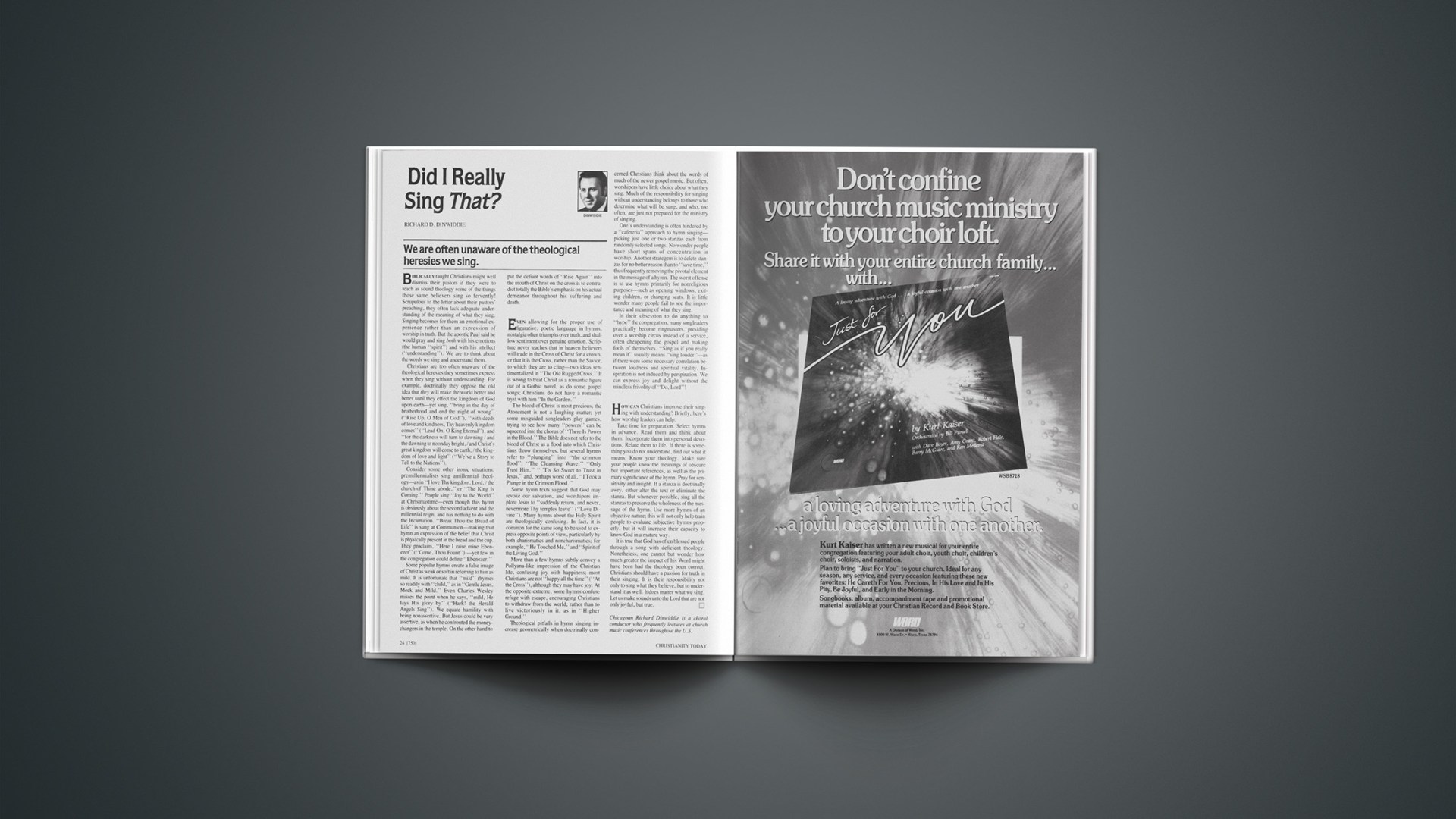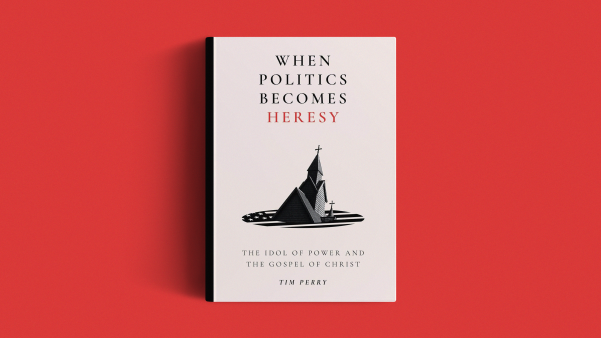We are often unaware of the theological heresies we sing
Biblically taught Christians might well dismiss their pastors if they were to teach as sound theology some of the things those same believers sing so fervently! Scrupulous to the letter about their pastors’ preaching, they often lack adequate understanding of the meaning of what they sing. Singing becomes for them an emotional experience rather than an expression of worship in truth. But the apostle Paul said he would pray and sing both with his emotions (the human “spirit”) and with his intellect (“understanding”). We are to think about the words we sing and understand them.
Christians are too often unaware of the theological heresies they sometimes express when they sing without understanding. For example, doctrinally they oppose the old idea that they will make the world better and better until they effect the kingdom of God upon earth—yet sing, “bring in the day of brotherhood and end the night of wrong” (“Rise Up, O Men of God”), “with deeds of love and kindness, Thy heavenly kingdom comes” (“Lead On, O King Eternal”), and “for the darkness will turn to dawning / and the dawning to noonday bright, / and Christ’s great kingdom will come to earth, / the kingdom of love and light” (“We’ve a Story to Tell to the Nations”).
Consider some other ironic situations: premillennialists sing amillennial theology—as in “I love Thy kingdom. Lord, / the church of Thine abode,” or “The King Is Coming.” People sing “Joy to the World” at Christmastime—even though this hymn is obviously about the second advent and the millennial reign, and has nothing to do with the Incarnation. “Break Thou the Bread of Life” is sung at Communion—making that hymn an expression of the belief that Christ is physically present in the bread and the cup. They proclaim, “Here I raise mine Ebenezer” (“Come, Thou Fount”)—yet few in the congregation could define “Ebenezer.”
Some popular hymns create a false image of Christ as weak or soft in referring to him as mild. It is unfortunate that “mild” rhymes so readily with “child,” as in “Gentle Jesus, Meek and Mild.” Even Charles Wesley misses the point when he says, “mild. He lays His glory by” (“Hark! the Herald Angels Sing”). We equate humility with being nonassertive. But Jesus could be very assertive, as when he confronted the moneychangers in the temple. On the other hand to put the defiant words of “Rise Again” into the mouth of Christ on the cross is to contradict totally the Bible’s emphasis on his actual demeanor throughout his suffering and death.
Even allowing for the proper use of figurative, poetic language in hymns, nostalgia often triumphs over truth, and shallow sentiment over genuine emotion. Scripture never teaches that in heaven believers will trade in the Cross of Christ for a crown, or that it is the Cross, rather than the Savior, to which they are to cling—two ideas sentimentalized in “The Old Rugged Cross.” It is wrong to treat Christ as a romantic figure out of a Gothic novel, as do some gospel songs; Christians do not have a romantic tryst with him “In the Garden.”
The blood of Christ is most precious, the Atonement is not a laughing matter; yet some misguided songleaders play games, trying to see how many “powers” can be squeezed into the chorus of “There Is Power in the Blood.” The Bible does not refer to the blood of Christ as a flood into which Christians throw themselves, but several hymns refer to “plunging” into “the crimson flood”: “The Cleansing Wave,” “Only Trust Him,” “ ’Tis So Sweet to Trust in Jesus,” and, perhaps worst of all, “I Took a Plunge in the Crimson Flood.”
Some hymn texts suggest that God may revoke our salvation, and worshipers implore Jesus to “suddenly return, and never, nevermore Thy temples leave” (“Love Divine”). Many hymns about the Holy Spirit are theologically confusing. In fact, it is common for the same song to be used to express opposite points of view, particularly by both charismatics and noncharismatics; for example, “He Touched Me,” and “Spirit of the Living God.”
More than a few hymns subtly convey a Pollyana-like impression of the Christian life, confusing joy with happiness; most Christians are not “happy all the time” (“At the Cross”), although they may have joy. At the opposite extreme, some hymns confuse refuge with escape, encouraging Christians to withdraw from the world, rather than to live victoriously in it, as in “Higher Ground.”
Theological pitfalls in hymn singing increase geometrically when doctrinally concerned Christians think about the words of much of the newer gospel music. But often, worshipers have little choice about what they sing. Much of the responsibility for singing without understanding belongs to those who determine what will be sung, and who, too often, are just not prepared for the ministry of singing.
One’s understanding is often hindered by a “cafeteria” approach to hymn singing—picking just one or two stanzas each from randomly selected songs. No wonder people have short spans of concentration in worship. Another strategem is to delete stanzas for no better reason than to “save time,” thus frequently removing the pivotal element in the message of a hymn. The worst offense is to use hymns primarily for nonreligious purposes—such as opening windows, exiting children, or changing seats. It is little wonder many people fail to see the importance and meaning of what they sing.
In their obsession to do anything to “hype” the congregation, many songleaders practically become ringmasters, presiding over a worship circus instead of a service, often cheapening the gospel and making fools of themselves. “Sing as if you really mean it” usually means “sing louder”—as if there were some necessary correlation between loudness and spiritual vitality. Inspiration is not induced by perspiration. We can express joy and delight without the mindless frivolity of “Do, Lord”!
How can Christians improve their singing with understanding? Briefly, here’s how worship leaders can help:
Take time for preparation. Select hymns in advance. Read them and think about them. Incorporate them into personal devotions. Relate them to life. If there is something you do not understand, find out what it means. Know your theology. Make sure your people know the meanings of obscure but important references, as well as the primary significance of the hymn. Pray for sensitivity and insight. If a stanza is doctrinally awry, either alter the text or eliminate the stanza. But whenever possible, sing all the stanzas to preserve the wholeness of the message of the hymn. Use more hymns of an objective nature; this will not only help train people to evaluate subjective hymns properly, but it will increase their capacity to know God in a mature way.
It is true that God has often blessed people through a song with deficient theology. Nonetheless, one cannot but wonder how much greater the impact of his Word might have been had the theology been correct. Christians should have a passion for truth in their singing. It is their responsibility not only to sing what they believe, but to understand it as well. It does matter what we sing. Let us make sounds unto the Lord that are not only joyful, but true.
Carl F. H. Henry, first editor of Christianity Today, is lecturer at large for World Vision International. An author of many books, he lives in Arlington, Virginia.










